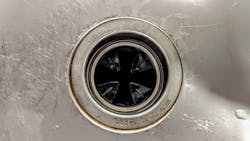Editor’s note: Welcome to So That Happened, our editors’ takes on things going on in the manufacturing world that deserve some extra attention. This will appear regularly in the Member’s Only section of the site.
Not Quite the Kitchen Sink, But Close
Nevertheless, earlier this week Whirlpool announced a $3 billion purchase that will further embed its products in both residential and commercial kitchens everywhere. The manufacturer reported that it would purchase InSinkErator, billed as the largest manufacturer of food waste disposers and instant hot water dispensers, in an all-cash transaction.
The seller in this deal is industrial automation manufacturer Emerson, which acquired InSinkErator in 1968. Per Emerson, InSinkErator’s trailing 12-month revenue, as of March 31, 2022, was $595 million, with pretax earnings of $148 million and EBITDA of $166 million. InSinkErator has a workforce of nearly 1,400.
Whirlpool has said it will operate InSinkErator as a separate business as part of Whirlpool’s North America region. Subject to normal conditions and regulatory approval, the deal is expected to close in the fourth quarter of 2022.
Filling Manufacturing Jobs with Workers Who are Autistic
With the right training, those on the autism spectrum can find jobs in manufacturing.
With that in mind, the Uniquely Abled Academy is offering free training in Meadville, Pennsylvania. The program is being offered to those in the community who are level 1 autism disorder (often called Asperger’s syndrome).
In the free, 16-week program participants will receive 405 hours of training as computer-numerical control operators. To ensure success students will also be taught soft skills around the areas of communication and workplace culture. And they are paired with a job coach who helps them transition to their new career.
Upon graduation students will be placed in precision machining jobs.
“This is a population that is underserved,” said Robert Zaruta, Erie-based Northwest Industrial Resource Center. “And the population is greater than the number of academy positions available this fall — that’s why we want to run multiple classes each year and expand the program.”
Check out My New Porsche… Bicycle?
Germany’s best-know sportscar brand is going much smaller with its next venture, creating Porsche eBike Performance. The company will slap the Porsche logo on electric bicycles that it’s developing (no word yet on how many Porsche-branded bicycle clothing options will go along with that or specialized Porsche pedaling shoes, Porsche outdoor sunglasses or Porsche car racks design to put Porsche eBikes and the backs of Porsche SUVs).
Planned drive systems will include motors, batteries and software architecture for connectivity solutions. The company is planning a new generation of Porsche eBikes by around 2025.
“We see great potential for Porsche in the eBike segment. This is why we are consistently expanding our activities in this area,” says Lutz Meschke, deputy chairman of the executive board of Porsche AG. “As is characteristic of Porsche, it's all about developing products that inspire people through intelligent design, sophisticated technology and outstanding performance.”
In recent months, Porsche has acquired stakes in several companies in the eBike segment, buying into Croatian eBike brand Greyp and increasing its stake in Fazua from 20% to full ownership.
Appalachian Spring of Grant Dollars
Intel’s announcement of its plan to build a $3 billion semiconductor campus near Columbus, Ohio, last spring was welcome news for the already prosperous area around Ohio State University. But it remains to be seen whether the benefits will extend to much further-flung counties in Appalachia and still-struggling legacy manufacturing cities areas in other parts of the state, like, for instance, Lorain and Youngstown. Many small and medium-sized manufacturers, which are the bread-and-butter of industry in those parts of the state, are finding it difficult to upskill their workforce with limited resources and also find and nurture new talent that will thrive on an increasingly digitized manufacturing floor.
A $23.5 million grant to the Ohio Manufacturers’ Association from the federal Good Jobs Challenge is on its way to help with that upskilling. The grant, administered through Industry Sector Partnerships throughout the state, will partner manufacturers and community-based organizations “to recruit and retain women and other individuals from underrepresented populations, as well as residents of Appalachian coal communities” for careers in manufacturing.
The Ohio grant is one of 32 given to industry-led workforce partnerships across the country in the $500 million Challenge, part of the Biden administration’s American Rescue Plan and administered by the U.S. Commerce Department. Ohio’s is also the only grant targeted solely to manufacturing; others are a combination of industries including healthcare, construction and transportation.
“This project creates new high-paying job opportunities that ensure that economic prosperity reaches all pockets of Ohio and Appalachia,” said Alejandra Y. Castillo, assistant U.S. secretary of Commerce for Economic Development, in a statement.
Some 509 agencies applied for the grants. The OMA, the Washington Student Achievement Council and the Washington Technology Industry Association Workforce Institute received the largest grants.
Hydraulics Companies on the EV Bandwagon?
For many Tier 1 automotive suppliers, the rapidly developing shift toward electric vehicles is an existential crisis. EV’s have significantly fewer moving parts that must be machined, lowering the manufacturing input from the supply chain.
But, as any physicist will tell you, energy exchange generates heat, whether it’s from fuel combusting inside engine cylinders or electricity discharging from batteries. And, that’s where cooling and fluid handling automotive supplier Cooper Standard sees an opening.
The Michigan-based company is partnering with Italy’s Saleri to create a family of high-performance coolant fluid management devices for EV batteries. Effectively, Cooper and Saleri see a continued need for radiators, water pumps and liquid cooling in EVs. Battery temperature management is a growing field of focus within the EV space as batteries are extremely inefficient when too cold and can be dangerous when too hot.
Cooper and Saleri’s products use pumps with advanced fluid control, routing and connection technologies, potentially simplifying EV architectures.
Tom Stimson, vice president engineering and product development at Cooper Standard said, “The core competencies and capabilities of both companies provide a unique blend of expertise to optimize fluid flow in the vehicle, offering our customers improved operational vehicle performance.”
About the Author
IW Staff
Find contact information for the IndustryWeek staff: Contact IndustryWeek

